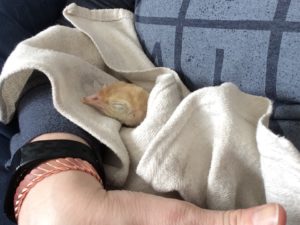Since receiving my turkeys mail order 2 months ago, our turkey chicks have proven to be tough little birds. Having only 5 made it imperative that they survive and it seemed, unlike many of our Cornish Cross chicks, they were rockin’ it. The one in the photo below was always calling for attention and loved to snuggle — so spoiled!

I pay close attention to my birds and our animals in general. As a caregiver, you develop a sense when something is “off”. There may be no other way to describe it beyond that, you just know. I’ve had my eye on the smallest pullet turkey for a few days now. Her head always seemed a bit paler, her body a bit more slight, and she was very submissive. Recently she’s had energy, but not quite like the rest.
One morning she made her way out to the far feeder in the enclosed pen where she sat by the feeder and slept. As I check on my birds a few times a day, I knew something was “off” when she didn’t follow the other 4 turkeys to meet me with the usual turkey curiosity. I immediately went over and woke her, but she still didn’t show any interest. She was dull, quiet and weak. That was when I knew I had a pretty sick girl on my hands.
The first step was to separate her from the rest of the animals. Testing her weakness, she had poor balance and coordination, little interest in food and appeared like she only wanted to sleep. She could stand but she walked like a drunkard who had had one too many. I prepared a quarantine space for her with pine shavings, food, and water with electrolytes. Still nothing — she just sat and closed her eyes.
Progressively throughout the day, she was worsening. Before long, she could no longer stand or walk. I did get her to take a few bites of scrambled egg but she wouldn’t even touch the blueberries I had for her. To keep her fluids up, I syringed an electrolyte, vitamin, honey and lactobacillus mixture to her beak. She took it but promptly fell back asleep.
After a quick chat with a local vet, we decided to wait and see. We were trying to avoid medicating the entire flock because our Cornish Crosses were destined for the freezer in less than a week. By waiting, we could see if this was a one-off illness or if further birds would develop any issues. I feared this girl would be a loss and she wouldn’t make it through the night.
The poor girl did make it through the night and the next night after that. I still had hope that she would get better as she finally ate her whole blueberries, soggy rolled oats, and water through a syringe. Sadly, she continued to lose most of her head coordination and control of her legs and wings was dwindling.
It wasn’t until the third morning that we decided to let her go. Not an easy decision, but one that had to be done. My husband woke me to tell me she was laying on her back and had difficulty breathing. She had kicked with her nearly useless legs and couldn’t right herself. She showed no interest in food and was so thin I knew it was time. The deed was done after some calming talk and loving care.
I did conduct my own necropsy to rule out any necrotic liver lesions that might indicate Merek’s Disease or even Blackhead — she was clear. There were also no indications of Intestinal Enteritis or Gape Worm. Of course, there was no way for me to check her blood for anything such as low iron or infection. Botulism could have also caused paralysis and the inability to control limbs, but my feed always stays dry, so that wasn’t likely. My only other conclusion was that it was either strictly neurological or she simply wasn’t able to process food and nutrients through her crop which was quite full of granite-based chick grit. Growing birds can weaken significantly without proper nutrient absorption.
The area where she was kept separate from the flock will be cleaned and sprayed with bleach water to sanitize. I would not want to risk another bird’s life, should they be injured and require quarantine. I do feel a little better after ruling out a couple of major diseases that could potentially affect my entire flock.
Just as my husband and I both murmured before the cull. She was, “…a good girl and it’s ok, no more suffering.” That was the summary of this week’s reality of living on the farm













1 Comment
One of my baby turkeys is doing the same thing.